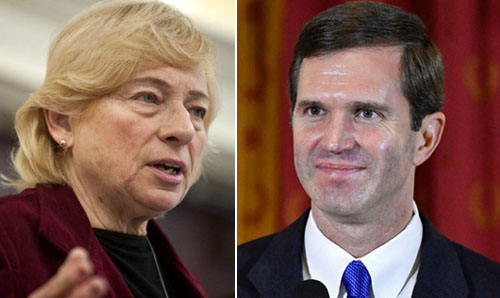by WorldTribune Staff, May 7, 2020
In backing the pastor of a Virginia church who was threatened with jail time for violating the state’s coronavirus lockdown restrictions by holding a service with more than 10 people, the Department of Justice paved the way for more places of worship to sue governors who ban in-person services.

On May 6, churches in Maine and Kentucky filed complaints against their governors.
In Maine, Calvary Chapel filed suit against Democratic Gov. Janet Mills, saying the governor’s order restricting religious gatherings to 10 people is a violation of the First Amendment’s freedom of religion and assembly clauses.
The suit was filed by Liberty Counsel, a legal nonprofit organization whose co-founder Mat Staver told the Washington Examiner that he considers all bans on church services “unconstitutional.” In the complaint, the group makes the argument that governments do not have the authority to limit religious freedoms during a pandemic.
“As is often true in times of crisis, Calvary Chapel respectfully submits that in an effort to uphold her sworn duties Gov. Mills has stepped over a line the Constitution does not permit,” Calvary’s complaint said. “Because of that, Calvary Chapel brings this action to ensure that this court safeguards the cherished liberties for which so many have fought and died.”
Calvary has been holding drive-in services, but its pastor, Ken Graves, announced during a Sunday service that the church is moving toward in-person as well as drive-in services in an attempt to return to normalcy.
In Kentucky, Tabernacle Baptist challenged Democratic Gov. Andy Beshear’s ban on in-person services, saying it is unconstitutional and stating that allowing drive-in services is not enough for true religious assembly. Tabernacle Baptist is represented by the First Liberty Institute, a legal nonprofit organization that has represented several drive-in cases in the past month.
“Tabernacle has a sincerely-held religious belief that online services and drive-in services do not meet the Lord’s requirement that the church meet together in person for corporate worship,” the complaint read. “Tabernacle also believes that online and drive-in church services are not substitutes for real in-person corporate worship.”
In both lawsuits, the churches are asking for temporary restraining orders on the bans, expressing concerns that they will face criminal penalties otherwise.
The Justice Department said in a May 3 statement that unless governors can show that continuing to keep churches under lockdown is part of a generally applicable order to pursue their “compelling interest” of ensuring public health, they are likely violating the First Amendment.
In the case of the Virginia church, Lighthouse Fellowship Church on Chincoteague Island, the DOJ said Democratic Gov. Ralph Northam cannot apply an unequal standard that trusts people to social distance at stores and in other businesses but does not trust people to social distance during a church service.
“It will be difficult for the Commonwealth to justify having one set of rules that allows for secular gatherings — such as in-person operations for any non-retail business and various other exemptions permitting large-scale retail gatherings — while denying to Lighthouse the ability to worship in modest numbers with appropriate social distancing and sanitizing precautions,” the statement read.
The DOJ’s statement came days after an Illinois church sued Democratic Gov. J.B. Pritzker for extending a ban on in-church services through May. Following the suit, Pritzker changed the limit from zero to 10. The church is demanding that Pritzker lift the restrictions entirely. The lawsuit was filed by the Thomas More Society on behalf of The Beloved Church of Lena and its pastor, Stephen Cassell.
Attorney General William Barr filed a statement of interest in March supporting a Mississippi church that was suing for the right to hold drive-in services. After Barr’s statement, many judges decided in favor of churches making similar cases.
Intelligence Brief __________ Replace The Media
